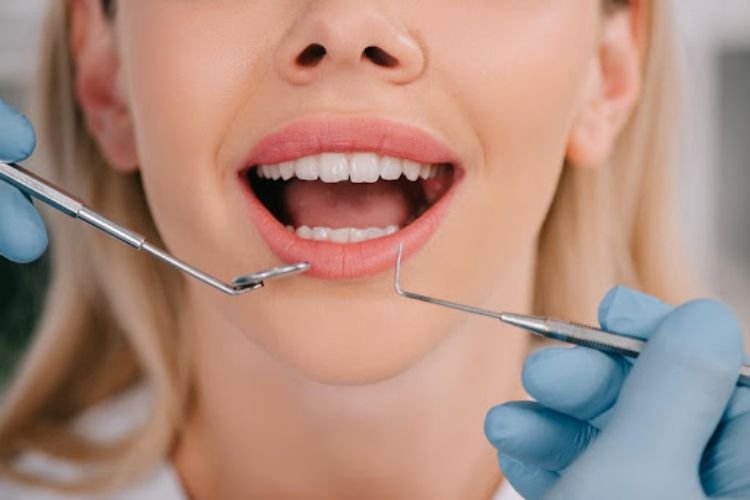Wisdom tooth extraction is a commonly performed dental procedure that can provide relief from pain, restore function, and enhance overall oral health. However, before making the decision to undergo this procedure, it’s essential to understand the complexities involved and the potential risks that come with it. This article will delve into the intricacies of wisdom tooth surgery in Singapore, including what wisdom teeth are, their development and eruption, when removal may be necessary, and the associated risks. Additionally, we will offer some helpful tips for successful postoperative recovery. Armed with this knowledge, you’ll be better equipped to make an informed decision about whether wisdom tooth extraction is right for you.
 What is Wisdom Tooth Extraction?
What is Wisdom Tooth Extraction?
Wisdom tooth extraction involves the surgical removal of one or more third molars located at the back of your mouth. These molars, also called wisdom teeth, usually emerge in the late teens or early twenties and frequently cause dental problems due to overcrowding.
Wisdom tooth extraction is a common procedure aimed at preventing overcrowding, pain, and other complications resulting from having too many teeth. The surgery is performed under local anesthesia to numb the area, thus minimizing pain during the operation. During surgery, the dentist will make an incision in your gums to expose the tooth/teeth that need to be extracted. Once exposed, special tools will be used to loosen and remove them from their sockets. In some cases, the bone may need to be removed as well if it’s preventing full access for the removal of the wisdom teeth.
Once all the necessary extractions have been made, the dentist will use sutures (stitches) to close up any incisions made. Depending on the number of teeth removed and the level of difficulty encountered, recovery times may vary significantly, ranging from one to two weeks before you can resume normal activities such as eating solid foods without discomfort.
Causes of Impacted Teeth
Impacted teeth are a prevalent dental condition resulting from tooth eruption issues. These teeth become trapped within the bone or soft tissue, causing pain, infection, and damage to neighboring teeth if not promptly treated.
The primary cause of impacted teeth is inadequate space for the tooth to emerge from beneath the gums. This situation can occur due to overcrowding or if a permanent adult tooth has not fallen out due to a lack of space for it to come through. Misalignment in your jaw can also cause impacted wisdom teeth, preventing them from erupting into the proper position.
Physical obstruction, such as tumors or cysts that block the path of teeth attempting to emerge into place, can also cause impacted teeth. This type of issue is more commonly observed with wisdom teeth since they tend to develop later than other types of adult molars and premolars. Poor oral hygiene habits like insufficient brushing and flossing can also contribute to the formation of impacted teeth. Food particles get stuck around these areas, creating an environment that encourages bacterial growth, which leads to inflammation.
Symptoms of Impacted Teeth
Impacted teeth can cause several uncomfortable symptoms, including jaw, neck, head, and ear pain, pressure in the gums surrounding the affected area, and swelling. These teeth can occur with wisdom teeth but may affect any tooth. In some cases, the discomfort may be sharp or dull and may come and go in intensity. It is also possible for jaw pain caused by an impacted tooth to spread to other areas like the face or shoulders.
Diagnosis and Evaluation Process for Wisdom Tooth Surgery
Wisdom teeth, also called third molars, are the final teeth to erupt in the mouth. While some people may never develop wisdom teeth, others may experience pain and discomfort when they do. In such cases, wisdom tooth surgery may be recommended to alleviate symptoms and improve dental health. The diagnosis and evaluation process for wisdom tooth surgery involves a thorough examination of your mouth by an oral surgeon or dentist.
 You can help minimize your risk of developing impacted teeth by following a few simple steps. Regular brushing and flossing, avoiding sticky and hard-to-chew foods, and scheduling regular dental checkups are all important in maintaining good oral health.
You can help minimize your risk of developing impacted teeth by following a few simple steps. Regular brushing and flossing, avoiding sticky and hard-to-chew foods, and scheduling regular dental checkups are all important in maintaining good oral health.
Conclusion
Wisdom tooth surgery is a common dental procedure that can help alleviate pain, restore function, and improve overall oral health. If you are experiencing discomfort or have been diagnosed with impacted wisdom teeth, you may benefit from having them removed. However, it’s important to understand the potential risks and recovery process before making a decision. By working closely with your dentist or oral surgeon, you can develop a treatment plan that best fits your needs and helps you achieve optimal dental health. Remember, maintaining good oral hygiene habits is key to preventing dental problems like impacted teeth and reducing the need for more extensive treatments like surgery.




